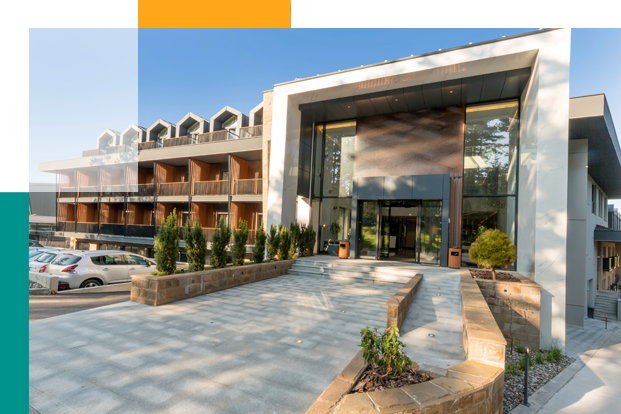Hotel Refinancing for Commercial Properties: The Ultimate Guide

Hotel property refinancing is a financial strategy that allows hotel owners to optimize their cash flow, reduce debt, and invest in property improvements. By refinancing, hotel owners can take advantage of lower interest rates, better loan terms, or free up equity to fund growth or expansion. Navigating the landscape of hotel property refinancing can often seem like an intricate maze filled with bewildering terms, complex calculations, and a multitude of options. However, with the right insights and guidance, this process can become a strategic tool to elevate your property’s financial health and long-term growth.
This comprehensive guide aims to demystify the process, providing you with a clear understanding of refinancing principles, steps, potential risks, and benefits. Whether you are an experienced hotelier, a new investor, or simply seeking to deepen your knowledge, this guide will empower you to make informed decisions, optimally leverage your assets, and propel your hotel business towards a prosperous future.
Table of Contents
- The Importance of Refinancing in the Hotel Industry
- Types of Hotel Refinancing: Traditional, Cash-out, and SBA Loans
- Preparing for Hospitality Property Refinancing
- The Role of Credit and Valuation in Refinancing
- Negotiating Terms and Rates in Refinancing
- The Refinancing Process: Step-by-Step
- The Impact and Benefits of Refinancing
- Risks and Challenges in Hotel Property Refinancing
- Future Trends in Hotel Property Refinancing
- Frequently Asked Questions (FAQs)
The Importance of Refinancing in the Hotel Industry
In the highly competitive hotel industry, staying ahead of the curve is crucial. Refinancing can provide hotel owners with the financial flexibility they need to adapt to changing market conditions, capitalize on growth opportunities, and maintain a healthy bottom line. Hotel property refinancing involves replacing an existing loan with a new one that offers better terms or interest rates. This can be done through traditional refinancing, cash-out refinancing, or Small Business Administration (SBA) loans.
Types of Hotel Refinancing: Traditional, Cash-out, and SBA Loans
Traditional refinancing involves replacing the current loan with a new one at a lower interest rate or better terms, while cash-out refinancing allows hotel owners to access their property’s equity by taking out a larger loan than the existing mortgage balance. SBA loans are government-backed loans that provide hotel owners with lower interest rates and flexible terms.
Preparing for Hospitality Property Refinancing
Evaluating Your Current Financial Situation
Before refinancing, hotel owners should assess their current financial position, including their existing loan terms, interest rate, and remaining loan balance. This will help determine if refinancing is a viable option and what type of refinancing would be most beneficial.
Planning Ahead: Timing and Market Considerations
Timing is crucial in the refinancing process, as interest rates and market conditions can fluctuate. Hotel owners should monitor market trends and consider refinancing when interest rates are low or when their property value has increased significantly.
Gathering Essential Documents: What Lenders Need to See
To refinance a hotel property, owners must provide lenders with essential documentation, including financial statements, tax returns, and property appraisals. These documents help lenders assess the hotel’s financial health and determine the appropriate loan terms and interest rate.
The Role of Credit and Valuation in Refinancing
Understanding the Importance of Creditworthiness
Creditworthiness is crucial in the refinancing process, as it determines the interest rate and loan terms offered by lenders. Hotel owners with strong credit scores will be more likely to secure favorable refinancing options.
Valuation of Hotel Property: Methods and Considerations
Hotel property valuation is a critical factor in determining the amount and terms of a refinancing loan. Common valuation methods include the income approach, sales comparison approach, and cost approach. Factors such as location, property condition, and market demand can influence a hotel’s value.
How Credit and Valuation Influence Your Refinancing Options
A strong credit score and a high property valuation can help hotel owners secure more favorable refinancing options, including lower interest rates and flexible loan terms. Conversely, a weak credit score and low property valuation may limit refinancing options or result in higher interest rates.
Negotiating Terms and Rates in Refinancing
Decoding Interest Rates: Fixed vs. Variable
Interest rates can be either fixed or variable, with fixed rates remaining constant throughout the loan term and variable rates adjusting periodically based on market conditions. Hotel owners should consider their financial goals and market outlook when choosing between fixed and variable rates.
Loan Term Lengths and Their Implications
Loan terms can range from short-term (less than five years) to long-term (up to 30 years). Shorter terms often have lower interest rates but higher monthly payments, while longer terms have higher interest rates but lower monthly payments. Hotel owners should consider their cash flow needs and long-term financial goals when selecting a loan term.
The Art of Negotiation: Securing Favorable Terms
Negotiating with lenders is essential for securing favorable refinancing terms. Hotel owners should research market conditions, compare offers from multiple lenders, and leverage their creditworthiness and property valuation to negotiate the best possible terms.
The Refinancing Process: Step-by-Step
Pre-approval and Loan Application
The refinancing process begins with obtaining pre-approval from a lender, which provides an estimate of the loan terms and interest rate. Hotel owners then submit a formal loan application, along with the necessary documentation.
Property Appraisal and Loan Underwriting
After receiving the loan application, the lender will conduct a property appraisal to determine the hotel’s value. The lender will also review the borrower’s financial information and credit history during the underwriting process to determine loan eligibility and terms.
Closing the Deal: What to Expect
Once the loan has been approved, the borrower and lender will sign the loan documents, and the existing mortgage will be paid off with the new loan proceeds. Closing costs, including appraisal fees, title fees, and loan origination fees, must also be paid at this time.
The Impact and Benefits of Refinancing
How Refinancing Can Improve Cash Flow
Refinancing a hotel property can improve cash flow by lowering monthly mortgage payments, reducing interest rates, or extending loan terms. This can free up funds for property improvements, debt repayment, or other business investments.
Refinancing for Renovation and Expansion
Refinancing can also provide hotel owners with the necessary funds to renovate or expand their property, allowing them to remain competitive in the market and attract more guests.
Debt Consolidation through Refinancing: Pros and Cons
Hotel owners can use refinancing to consolidate multiple loans into a single, more manageable loan with a lower interest rate. While this can simplify the repayment process and reduce interest costs, it may also extend the overall repayment period, resulting in more interest paid over time.
Risks and Challenges in Hotel Property Refinancing
Potential Pitfalls and How to Avoid Them
Refinancing a hotel property comes with potential risks, including higher interest rates, prepayment penalties, and extended loan terms. To avoid these pitfalls, hotel owners should carefully assess their financial situation, research market conditions, and consult with financial advisors before proceeding with refinancing.
The Impact of Economic Fluctuations on Refinancing
Economic fluctuations, such as changes in interest rates and market demand, can impact the feasibility and benefits of refinancing. Hotel owners should monitor economic trends and be prepared to adapt their refinancing strategies accordingly.
Future Trends in Hotel Property Refinancing
The hotel industry is constantly evolving, with new trends and technologies shaping the way we do business. The refinancing landscape is no exception, with several key trends expected to influence the way hotel properties are refinanced in the future. In this section, we will explore the influence of technology, sustainability, and blockchain on the future of hotel property refinancing.
The Influence of Technology on the Refinancing Landscape
Technology has revolutionized many aspects of the hotel industry, and refinancing is no exception. As new financial technology (FinTech) solutions emerge, we can expect to see more streamlined processes for refinancing hotel properties. For example, digital platforms and automated underwriting systems can make it easier for hotel owners to apply for refinancing, reducing the time and effort involved in securing a new loan.
Sustainability and Green Financing in the Hotel Industry
As global concerns about climate change and environmental sustainability grow, the hotel industry is increasingly embracing green initiatives. Green financing, which involves securing funding for projects that have environmental benefits, is becoming more popular in the hotel sector. We can expect to see more lenders offering green financing options, which may include lower interest rates or other incentives for properties that meet specific sustainability criteria.
The Role of Crypto and Blockchain in Future Refinancing
The rise of cryptocurrencies and blockchain technology has the potential to transform the way hotel properties are refinanced. Blockchain technology can increase transparency and security in the refinancing process, while cryptocurrencies might provide an alternative form of financing for hotel owners. As these technologies continue to develop, they could play a larger role in the hospitality landscape.
| Title | Description | Link |
|---|---|---|
| Hospitality and Hotel Financing: Best CRE Hotel Loan Options | A comprehensive guide to the best commercial real estate hotel loan options. | Read More |
| Hotel Bridge Loans: Swift Financial Solutions | Explore the fastest hospitality financing option with hotel bridge loans. | Read More |
| SBA Hotel Financing: Unlocking Growth Opportunities | Unlock growth opportunities with SBA hotel financing. Learn more in our guide. | Read More |
| Hotel Mezzanine Financing: Adaptable Loan Options | Discover adaptable loan options with hotel mezzanine financing. | Read More |
| Hotel Financing Refinancing Options: Enhance Your Bottom Line | Enhance your bottom line with our ultimate guide to hotel refinancing for commercial properties. | Read More |
| USDA Hotel Loans: Your Comprehensive CRE Hospitality Loan Guide | Your comprehensive guide to USDA hotel loans for commercial properties. | Read More |
Hotel Property Refinancing: The Bottom Line
Recap of Key Points in Hotel Property Refinancing
This can be a complex process, but understanding the key factors involved can help hotel owners make more informed decisions. Some of the main considerations include the reasons for refinancing, the types of loans available, and the importance of working with a reputable lender.
As technology, sustainability, and blockchain continue to influence the refinancing landscape, hotel owners will need to stay informed about these emerging trends.
The Importance of Continuous Learning in the Refinancing Landscape
Hotel owners should always be looking for ways to improve their understanding of the refinancing process. By staying informed about industry trends and best practices, hotel owners can make more informed decisions about refinancing their properties. This might include attending industry conferences, participating in webinars, or reading industry publications.
Frequently Asked Questions (FAQs)
How often should a hotel property be refinanced?
There is no one-size-fits-all answer to this question, as the ideal frequency of refinancing will depend on factors such as interest rates, property values, and the hotel owner’s financial goals. However, it’s generally a good idea to periodically review your loan terms and market conditions to determine whether refinancing could be beneficial.
What are the benefits of refinancing a hotel property?
Some potential benefits of refinancing a hotel property include securing a lower interest rate, reducing monthly payments, extending the loan term, or accessing additional funds for property improvements or other investments.
How does refinancing work if I have multiple hotel properties?
If you own multiple hotel properties, you may be able to refinance them as a portfolio, potentially securing more favorable terms than if you refinanced each property individually. This will depend on factors such as the lender’s requirements and the performance of each property.
Can I refinance even if my hotel is not currently profitable?
It may be more challenging to secure refinancing if your hotel is not currently profitable, as lenders typically prefer to work with borrowers who have a strong track record of financial performance. However, if you can demonstrate a clear plan for improving profitability or have other factors that may make your property more attractive to lenders, it may still be possible to refinance.
What is the role of a broker in when refinancing a hotel property?
A broker can serve as an intermediary between hotel owners and lenders, helping to identify potential refinancing options and navigate the application process. Brokers often have extensive industry knowledge and relationships with various lenders, which can help hotel owners secure more favorable loan terms.



